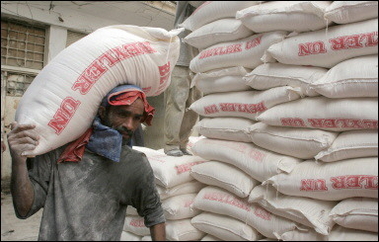|
Australian inquiry into oil-for-food scandal stretches to Pakistan
(AFP)
Updated: 2006-01-20 14:16
The Australian wheat exporter caught up in the Iraq oil-for-food scandal
could potentially also have made illegal payments to agents in Pakistan to
ensure contracts, an inquiry heard.
The commission of inquiry into the AWB (Australian Wheat Board) heard that
the company granted legal indemnity to two employees because they were worried
that payments made to two agents in Islamabad and Karachi could amount to
bribing foreign officials.
The company's internal documents reveal that the Pakistani agents received
unusually high payments -- with one apparently paid four million US dollars
after extracting 4.00 US dollars per tonne for a one million tonne shipment of
wheat.
An internal audit report noted that the major risk with such large
transactions was they could enable the agents to make payments to Pakistani
officials.

An Iraqi worker carries bags of government
wheat rations in the Shiite Baghdad suburb of Sadr
City.[AFP/file] | The report also revealed that one Pakistani agent told AWB officials that
"payments of outstanding receivables" from the Pakistan government would not
proceed if AWB's deal with him was terminated.
The two former AWB employees, who cannot be named, insisted on legal
indemnity when they left the company.
The audit report noted that one of the employees "stated that if he did not
obtain an indemnity he would go to lawyers" in relation to the Pakistan
payments.
The release documents for the two employees were signed by AWB chief
executive officer Andrew Lindberg.
They contain the clause: "AWB acknowledges that it (by its board and chief
executive officer) authorised agency payments during the period 15 December 1999
to 28 June 2000 to overseas agents for sales."
Asked about the Pakistan payments during Friday's hearing, Lindberg said he
did not recall whether he had been advised that the payments were illegal.
"I was advised that agency payments had been made; I acted on the advice I
received," he said.
"I believe that advice was that this release ... didn't protect them to the
extent that they did things that weren't within the approved policies or were
unlawful," he told the inquiry.
Australian Prime Minister John Howard called for an inquiry into AWB last
year after it was named as one of scores of companies involved in paying
kickbacks to the former Iraqi government under the UN oil-for-food programme.
The 1996-2003 UN programme was designed to allow Iraq to export a limited
amount of oil, with the proceeds being used to purchase food and medicine to
lessen the impact of sanctions on civilians.
But a UN report into corruption of the system named AWB as paying the biggest
kickbacks to the Iraqi government, with some 220 million dollars funnelled
through a Jordanian front company.
|